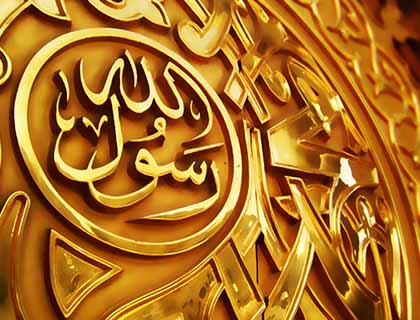Michael Hart states, “My choice of Muhammad to lead the list of the world’s most influential persons may surprise some readers and may be questioned by others, but he was the only man in history who was supremely successful on both the religious and secular levels.”
Indeed the unlettered Prophet Muhammad (PBUH), who lived in the desert of Arabia, has had the greatest impact on humanity.
After the passing of Abraham and Ishmael (peace be upon them), people gradually began worshipping idols. By the time of Prophet Muhammad’s (PBUH) birth, there were some 360 idols placed in Kaba. With the advent of idolatry also came rampant crime and oppression. Drinking, gambling, fornication and adultery were common. There were designated areas where men and women, married and unmarried, would go to sleep together. When a woman had a baby out of wedlock, she would compare the baby’s features to those of the men she had slept with and give the baby to the one it resembled most. Some families were so ashamed of having daughters that they buried their baby girls alive. In order to cope with the emotional trauma of such family instability and social disorder, drinking became common. Arabs fought and killed each other over the slightest matters. This was the society into which Prophet Muhammad (PBUH) was born.
Prophet Muhammad (PBUH) and his message had a profound impact. The entire Arabian society was changed from warring tribes into people united in worship of God. This society was transformed from one where adultery, drunkenness, gambling, robbery, racism, and oppression were rampant into a society united under the worship of God Almighty – one that encouraged its members to involve themselves in righteous actions and forbade evil ones.
Karen Armstrong stated, “By conquering Mecca, Muhammad had vindicated his prophetic claim. But this conquest had been achieved without bloodshed and Muhammad’s peaceful policy paid off. Within a few years paganism was quite dead in Mecca and some of Muhammad’s most committed enemies like Ikrimah and Suhayl became devout and fervent Muslims.”
By the time of the death of the Prophet almost the entire of Arabia had accepted Islam. Eventually Islam spread as far as China and Southern Europe.
What was the social impact of Prophet Muhammad (PBUH)? In this regard renowned British historian Arnold Toynbee remarked, “The extinction of race consciousness as between Muslims is one of the outstanding achievements of Islam, and in the contemporary world there is, as it happens, a crying need for the propagation of this Islamic virtue. . . . This Islamic spirit [of submission to divine guidance] may be expected to manifest itself in many practical ways, and one of these manifestations might be liberation from alcohol, which was inspired by religious conviction and which was therefore able to accomplish what could never be enforced by the external sanction of an alien law. . . .”
Many historians, such as Montgomery Watt, Karen Armstrong, and Annie Besant, have attested to this fact. Yet, as Prophet Muhammad (PBUH) said throughout his mission, he was only a man conveying the revelations given to him by God.
I think it is clear that Muhammad (PBUH) was more than a reformer or philosopher. He brought about real change and peace and impacted the world. Hence, I believe a serious study of his life and accomplishments is something to be considered.
It is hard for intellect alone to believe in the possibility of prophetic inspiration. Intellect is the consciousness reflected in the knowledge of names and forms. Wisdom is consciousness in its pure essence, which is not necessarily dependent upon the knowledge of names and forms.
The gift of wisdom gives vision in to the real nature of things as the X-ray penetrates material bodies. Wisdom has been specially bestowed upon certain persons, and in these rare cases the receivers of it are more than merely wise, and may be regarded as the very manifestation of wisdom. They are the prophets, who have foresight, inspiration, intuition, clairvoyance, and clairaudience as their inborn attributes.
A Sufi considers all prophets and sages as the one embodiment of God’s pure consciousness or the manifestation of divine wisdom, appearing on earth for the awakening of man from his sleep of ignorance, in different names and forms. Just as one’s own sub-consciousness would awaken one at a certain time. If previously warned, in the same way the consciousness of God is the agency for awakening His manifestation, projecting itself through different names and forms to accomplish His desire of being known.
Each prophet had a mission to prepare the world for the teaching of the next; each one prophesied the coming of the next, and the work was thus continued by all the prophets until Mohammed (PBUH) – the last messenger of divine wisdom – came on his mission. In his turn gave the final statement of divine wisdom: “None exists but Allah.” This message fulfilled the aim of prophetic mission. This final definition is a clear interpretation of all religions and philosophies in the most apparent form. There was no necessity left for any more prophets after this divine message, which created the spirit of democracy in religion by recognizing God in every being. By this message man received the knowledge that he may attain the highest perfection under the guidance of a spiritual teacher.

